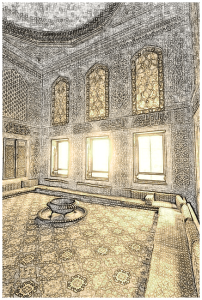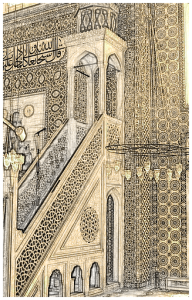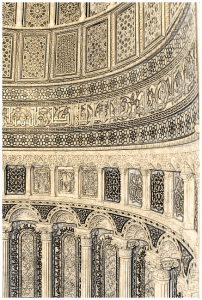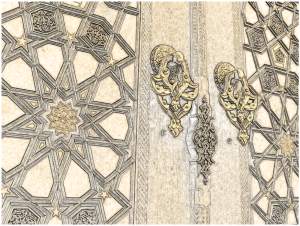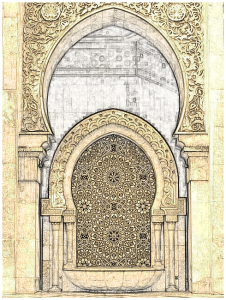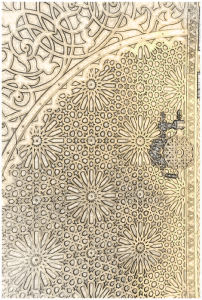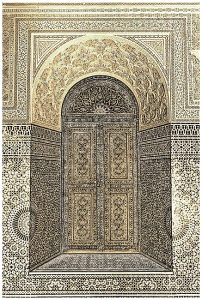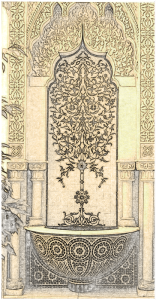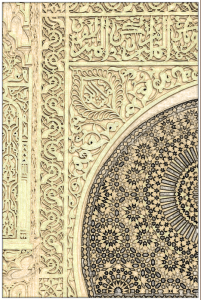Muslim Contributions To Science and Art
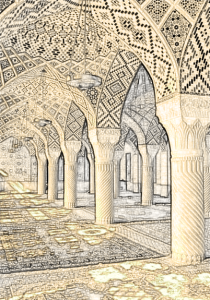 This is an excerpt from Ch. 13, ‘Muslim Contributions to Science and Art’ from the book “Introduction to Islam” by Dr. M. Hamidullah.
This is an excerpt from Ch. 13, ‘Muslim Contributions to Science and Art’ from the book “Introduction to Islam” by Dr. M. Hamidullah.
Just as many are there sciences, so many do we require specialists from among the historians to describe adequately the Muslim contribution to each branch and to collaborate in the compilation of a general survey of this vast subject. Far from pretending to deal adequately with the topic, an attempt is made here to give information of a general nature relating to the role the Muslims have played in the development of the various arts and sciences.
General Attitude
444. Islam is a comprehensive concept of life and not merely a religion describing the relations between man and his Creator. Therefore it becomes necessary to, first of all, give an account of the attitude of Islam with respect to the pursuit of arts and sciences.
445. Far from discouraging a life of well-being in this world, the Qur’an gives expression again and again to directions like: “Say (O Muhammad): Who hath forbidden the adornment (beautiful gifts) of God which He hath brought forth for His bondsmen and the good things of His providing?” (7:32) It praises those “who say: Our Lord! Give unto us in this world that which is best and in the Hereafter that which is best, and guard us from the torment of Fire.” (2:201) It teaches mankind: “. . . . and neglect not thy portion of the world, and be thou kind even as God hath been kind to thee. ..” (28:77). It is this quest for well-being which attracts man to study and to learn, in as perfect a manner as possible, all that exists in the universe so as to profit by it and to be grateful to God for it. The Qur’an says: “And We have given you (mankind) authority on the earth, and appointed for you therein a livelihood; small are the thanks ye give:” (7:10; cf. 15: 20-21): And again: “He it is Who created for you all that is in the earth. . .” (2:29) further: “See ye not how God hath made service able unto you whatsoever is in the skies and whatsoever is in the earth and hath loaded you with His favours both without and within?” (31:20, cf. 14:32-33; 16:12, 33:65, 65:11-12, etc.). On one hand, the Qur’an reminds men of their duty of worshipping the One “Who hath fed them against hunger, and hath made them safe from fear” (106:4) and on the other hand, it tells them of the need for effort in this world of cause and effect: “And man hath only that for which he maketh effort.” (53:39) The Qur’an (30:42) urges men not only to go on exploration: “Say: Travel in the land and see the nature of the end of those who were before you,” but also for new discoveries …” “… who meditate over the creation of the heavens and the earth, (and say:) Our Lord! Thou createdst not this in vain.” (3:191)
446. As to the method of increasing knowledge, it is inspiring to note that the very first revelation that came to the Prophet, who was born amongst illiterate people, was a command to read and write, and the praise of the pen which is the only means or custodian of human knowledge: “
Read with the name of thy Lord, Who createth,
Createth man from a clot. Read, and thy Lord is the Most Bounteous,
Who teacheth by the pen: Teacheth man that which he knew not.” (Q. 96:1-5).
It also reminds us: “. . . and ask the people of remembrance if ye know not” (16:43, 21:7), as also: ” . . . and of knowledge ye have been vouchsafed but little” (17:85). Further: ” . . . We raise by grades whom We will, and over every possessor of knowledge there is one more knowing” (12:76). What abeautiful prayer is the one which the Qur’an teaches man: “… and say: my Lord! Increase me in knowledge” (20:114).
447. Prophet Muhammad said: “Islam is built on five fundamentals: Belief in God, Service of worship, Fasting, Pilgrimage of the House of the One God, and the Zakat-tax.” If belief demands the cultivation of the theological sciences, the other requires a study of the mundane sciences. For the service of worship, one faces towards Mecca, and the service must be celebrated on the occurrence of certain determined natural phenomena. This requires knowledge of the elements of geography and astronomy. Fasting also requires the understanding of natural phenomena, such as the appearance of the dawn, the setting of the sun, etc. The pilgrimage necessitates knowledge of the routes and the means of transport in order to proceed to Mecca. Payment of the Zakat requires knowledge of mathematics, which knowledge is also necessary for calculations for the distribution of the heritage of the deceased. Similarly there is the fundamental need of the understanding of the Qur’an in the light of historical facts and allusions and references to the sciences contained therein. In fact, the study of the Qur’an requires first of all a knowledge of the language in which it is compiled (the linguistic sciences) and its references to various peoples demand a knowledge of history and geography, and so on and so forth.
448. Let us recall that when the Prophet began an independent life, settling down in Madinah, his first act was the construction of a mosque with a portion reserved for the purpose of a school (the celebrated Suffah) which served during the day as a lecture hall, and during the night as a dormitory for students.
449. God helps those who help the cause of God, is repeated often in the Qur’an (47:7, 22:40). It is not surprising if Muslims had the good fortune to possess abundant and cheap paper so as to spread knowledge among the masses. Since the second century of the Hijrah, there began to be established factories for the manufacture of paper all over the vast Muslim empire.
450. For purposes of this short sketch, we shall refer only to a few sciences in which the contribution of the Muslims has been particularly important for mankind.
Religious and Philosophical Sciences
451. The religious sciences began, naturally enough, with the Qur’an which the Muslims received as the Word of God, the Divine Message addressed to man. Its perusal and understanding necessitated the study of the linguistic, grammatical, historical, and even the speculative sciences, along with many others – which gradually developed into independent sciences of general utility. The recitation of the sacred text brought into being, and developed, the religious “music” of Islam (to which we shall revert later). The preservation of the Qur’an led to improvements in the Arabic script, not only from the point of view of precision, but also of beauty. With its punctuation and vocalization, the Arabic script is incontestably the most precise for the needs of any language in the world. The universal character of Islam necessitated the understanding of the Qur’an by non-Arabs; and we see a series of translations, from the very time of the Prophet (Salman al-Farsi had translated parts of it into Persian) continuing to our own day, and there is no end to it in sight. It is necessary to point out that these translations were made solely for the purpose of understanding the contents by those who did not know Arabic, yet never for liturgical purposes. For in the service of worship, one uses only the Arabic text. And the method adopted by order of the Prophet for the preservation of the integrity of the sacred text was perpetuated, namely recording by writing, and learning by heart, both done simultaneously. Each process was to help the other in guarding against forgetfulness or the commission of error. The institution of a judicial method of verification further perfected the system. Thus, one was required not only to procure a copy of the Qur’an, but also to read it from the beginning to the end before a recognized master, in order to obtain a certificate of authenticity. This practice continues to this day.
452. As in the case of the Qur’an, Muslims were also attached to the sayings of the Prophet. The reports of his sayings and doings, both public and private, were preserved. The preparation of such memoirs began even in the lifetime of the Prophet, on the private initiative of certain of his companions, and was continued after his death, by a process of collection of first hand knowledge. As was the case of the Qur’an, authenticity was insisted on in all transmissions. One could relate all that is known of the lives of Noah, Moses, Jesus, Buddha and other great men of antiquity, in a few pages only, but the known details of the biography of the Prophet Muhammad fills hundreds of pages, so great was the care that was taken to preserve for posterity documented and precise data.
453. The speculative aspect of the Faith, particularly in the matter of beliefs and dogmas, shows that the discussions which I began in the lifetime of the Prophet, became later the root cause of different sciences, such as the Kalam (dogmatico-scholastic), and tasawwuf (mystico-spiritualistic). The religious polemics with non-Muslims, and even among Muslims themselves, introduced foreign elements from Greek and Indian philosophy, etc. Later on, Muslims did not lack their own great philosophers endowed with originality and erudition, like al-Kindi, al-Farabi, Ibn-Sina (Avicenna), Ibn-Rushd (Averroes) and others. The Arabicization of foreign books resulted in the fortunate feature that scores of Greek and Sanskrit works, whose originals have now been lost, became preserved for posterity in their Arabic translations.
New Sciences
454. The part played by the Muslims in the development of the social sciences has been very important. A remarkable characteristic of Muslim science is the rapidity of its development. The Qur’an was the first book ever written in the Arabic language. Scarcely two hundred years later, this language of the illiterate Bedouins developed into one of the richest in the world, later to become not only the richest of all languages of the time, but also an international language for all sorts of sciences. Without stopping to discover the cause of this phenomenon, let us recall another fact. The first Muslims were almost all Arabs, yet with the exception of their language, which was the repository of the Word of God and of His Prophet, they effaced their own personality, under the influence of Islam, in order to receive in Islam all races on the basis of absolute equality. Therefore it is that all races have participated in the progress of the “Islamic” sciences: Arabs, Iranians, Greeks, Turks, Abyssinians, Berbers, Indians, and others, who have embraced Islam. Their religious tolerance was so great, and the patronage of learning so perfect, that Christians, Jews, Magians, Buddhists and others collaborated with a view to enrich the Muslim sciences, not only in the domain of their respective religious literature, but also in other branches of learning. Arabic had spread more widely than any other language of the world, since it was the official language of the Muslim State whose territory extended from China to Spain.
Law
455. In its comprehensive character, legal science developed among Muslims very early. They were the first in the world to entertain the thought of an abstract science of law, distinct from the codes of the general laws of the country. The ancients had their laws, more or less developed and even codified, yet a science which should treat the philosophy and sources of law, and the method of legislation, interpretation, application, etc., of the law was wanting, and this never struck the minds of the jurists before Islam. Since the second century of the Hijrah (800 C.E.) there began to be produced Islamic works of this kind, called Usul al-Fiqh.
456. In the days of antiquity, International Law was neither international nor law. It formed a part of politics and depended on the discretion and mercy of statesmen. Moreover, its rules applied only to a limited number of States inhabited by peoples of the same race, who followed the same religion and spoke the same language. The Muslims were the first to accord it a place in the legal system, creating both rights and obligations. This may be observed in the rules of international law that formed part of a special chapter in the codes and treatises of the Muslim law ever since the earliest times. In fact the most ancient treatise which we possess is the Majmu’ of Zaid ibn ‘Ali, who died in 120 H/737 C.E. That work also contains the chapter in question. Further, the Muslims developed this branch of study as an independent science, and monographs on the subject, under the generic title of Siyar, were found existing even before the middle of the second century of the Hijrah. In his Tawali at-Ta ‘sis, Ibn Hajar relates that the first monograph of the kind hailed from the pen of Abu Hanifah, the contemporary of the above-mentioned Zaid Ibn ‘Ali. The characteristic feature of this international law is, that it makes no discrimination among foreigners. It does not concern inter-Muslim relations, but deals solely with the non-Muslim States of the entire world. Islam in principle forms one single unit and one single organic community.
457. Another contribution in the legal domain is the comparative Case Law. The appearance of different schools of the Muslim law necessitated this kind of study, in order to bring into relief the reasons of their differences as well as the effects of each divergence of principle on a given point of law. The books of Dabusi and Ibn Rushd are classics on the subject. Saimuri wrote even a work of comparative jurisprudence or methodology of law (Usul al-Fiqh).
458. The written-constitution of the State is also an innovation of the Muslims. In fact, Prophet Muhammad was its author. When he established a City-State at Madinah, he endowed it with a written constitution, which document has come down to us, thanks to Ibn Hisham and Abu ‘Ubaid, and its contents could be divided into 52 clauses. It mentions in precise terms the rights and obligations of the head of the State, of constituent units, and of subjects respectively, in matters of administration, legislation, justice, defence, etc. It dates from the year 622 of the Christian era.
459. In the field of law proper, codes have appeared since the beginning of the second century of the Hijrah. They are divided into three principal parts: (i) cult or religious practices, (ii) contractual relations of all kinds, and (iii) penalties. In keeping with its comprehensive view of life, there was no differentiation in Islam between the mosque and the citadel. The doctrine of the State or constitutional law formed a part of the cult, since the leader of the State was the same as the leader of the service of worship. The revenues and finances also formed part of the cult, since the Prophet had declared them to be one of the four fundamentals of Islam, side by side with worship, fasting, and pilgrimage. International law formed part of the penalties, war being placed on the same level as action against marauding brigands, pirates and other violators of law or treaty.
460. It is due to this comprehensive view of law among Muslims, that we have discussed the question at length.
History and Sociology
461. The share of Muslims in these is important from two points of view, one being assurance in the matter of authenticity and the other the collection and preservation of the most varied details. Born in the full light of history, Islam did not require legends and hearsay. With regard to data concerning other peoples, each narration was accorded the value it merited. But the current history of Islam required a fully reliable measure to maintain such an integrity through the ages. Attestation by witnesses was once an exclusive feature of judicial tribunals. The Muslims applied it to history; one required evidence for each reported narration. If, in the first generation after the event, it sufficed to have one trustworthy witness of the event, in the second generation it was necessary to cite two successive sources: “I have heard A, telling me that he had heard B, who had lived at the time of the event, giving the details”. And in the third generation, three sources were required, and so on and so forth. These exhaustive references assured the truthfulness of the chain of the successive sources, for one could refer to biographical dictionaries which indicated not only the character of individual personages, but also the names of their teachers as well as of their principal pupils. This kind of evidence is available not merely in connection with the life of the Prophet, but even for all branches of knowledge transmitted from one generation to another, sometimes even in the domain of anecdotes meant simply for amusement and pastime.
462. Biographical dictionaries are a characteristic feature of Muslim historical literature. The dictionaries were compiled according to professions, towns or regions, centuries or epochs, etc. Equally great importance was given to genealogical tables, particularly amongst the Arabs; and the relationship of hundreds of thousands of persons of some importance, thus learnt, facilitates the task of the researcher who should desire to penetrate the underlying causes of events.
463. As to history proper, the characteristic trait of the chronicles is their universalism. If the pre-Islamic peoples produced national histories, then Muslims seemed to be the first to write these world histories, Ibn Ishaq (d. 769) for instance, who is one of the earliest historians of Islam, not only begins his voluminous annals with an account of the creation of the universe and the history of Adam, but he also speaks of other races that he knew, of his time – a task which was pursued with ever-increasing passion by his successors at-Tabari, al- Mas’udi, Miskawaih, Saa’id al Andalusi, Rashiduddin Khan and others. It is interesting to observe that these historians, (to begin with at-Tabari) commenced their work with a discussion on the notion of time. Ibn Khaldun dove deeper into these sociological and philosophical discussions, in his celebrated Prolegomena to Universal History.
464. Already in the first century of the Hijrah, two branches of history began to develop independently, and were later combined with one composite whole. One was Islamic history, beginning with the life of the Prophet and continuing through the time of the caliphs, and the other non-Muslim history, whether concerning pre-Islamic Arabia or foreign countries such as Iran, Byzantium, etc. A very clear instance is that of the history of Rashiduddin Khan, the major portion of which still remains to be printed. This was simultaneously prepared both in Arabic and Persian versions, and speaks with equal familiarity of the prophets, caliphs, and popes as well as the kings of Rome, China, India, Mongolia, etc.
Geography and Topography
465. Pilgrimage as well as commerce in the vast Muslim empire needed communication. Baladhuri and Ibn al-Jauzi report: “Every time the post departed for some destination or other (ranging from Turkestan to Egypt, and this happened almost daily) the Caliph ‘Umar used to have it announced in the metropolis so that private letters could also be despatched in time through the official courier.” The Directors of the Post prepared route-guides, whose publication was always accompanied by more or less detailed historico-economic description of each place, place-names being often arranged alphabetically. This literary geography led to other scientific studies. The geography of Ptolemy was translated into Arabic, and so were the Sanskrit works of Indian authors. Tales of travels and voyages increased daily the knowledge of the common man. The very diversity of the data counteracted all possibility of Chauvinism and one was obliged to put everything to practical test and trial. The dialogue of Abu-Hanifah (d. 767) reported by al-Muwaffaq, (1, 161) is well known: A Mu’tazilite asked him where the centre of the earth was, and he replied: “In the very place where thou art sitting!” This reply can be given only if one meant to convey that the earth was spherical. Even the earliest world maps, prepared by Muslims, represent the earth in circular shape. Ibn Hauqual’s (cir. 975) cartography, for instance, presents no difficulty at all in recognizing the Mediterranean or the Near-Eastern countries. The map of al-Idrisi, prepared for King Roger of Sicily, (1101-54), astonishes us by its great precision and exactitude; it marks even the sources of the Nile. One has to remember that the Arabo-Muslim maps point upwards to the South, the North downwards. The maritime voyages necessitated the tables of Latitude and Longitude as well as the use of the astrolabe and other nautical instruments. Thousands of Muslim coins, discovered in the excavations of Scandinavia, Finland, Russia, Kazan, etc., show conclusively the commercial activity of Muslim caravan-leaders during the Middle Ages. Ibn Majid, who served as pilot to Vasco da Gama as far as India, already speaks of the compass as a familiar thing. Muslim mariners astonished us with their skill and daring in their voyage from Basrah (Iraq) to China. The words arsenal, admiral, cable, monsoon, douane, tariff, which are all of Arabic origin, are substantial proof of the Muslim influence on modern Western culture.
Astronomy
466. The discovery and study of a number of stars is acknowledged to be a valuable and unforgettable contribution of the Muslims. A very large number of stars are still known in Western languages by their Arabic names, and it is Ibn-Rushd (Averroes) who recognized spots on the surface of the sun. The calendar reform by ‘Umar al-Khayyam outdistances by far the Gregorian one. The pre-Islamic Bedouin Arabs had already developed very precise astronomical observations, not only for their nocturnal travel in the desert, but also for meteorology, rain, etc. A number of books called Kitab al-Anwa, gives us sufficient proof of the extent of Arabic knowledge. Later, Sanskrit, Greek and other works were translated into Arabic. The confrontation of their divergent data required new experiments and patient observation. Observatories surfaced everywhere. Under the Caliph al-Ma’mun, the circumference of the earth was measured, the exactness of these results was astonishing. Works were compiled very early dealing with the ebb and flow of the tide, dawn, twilight, rainbows, halos, and above all the sun and the moon and their movements, since they are immediately related with the question of the hours of prayer and fasting.
Natural Science
467. The characteristic feature of this aspect of Islamic science is the emphasis laid on experiment and observation without prejudice. The Arabian method was quite unique and wonderful. The authors began their study of the sciences by the preparation of categorized dictionaries of technical terms, which were found in their own language. With extraordinary patience, they painstakingly scrutinized all books of prose and poetry, in order to sorting out terms -with useful citations – in each branch separately, such as anatomy, zoology, botony, astronomy, mineralogy, etc. Each successive generation revised the works of its predecessors so as to add something new thereto. These simple lists of words, with some literary or anecdotic observations, proved of immense value when the work of translation began. Rare were the cases in which one required to Arabicize, or conserve a foreign word in Arabicized form.
468. Words used in Botany are quite characteristic. Except for the names of certain plants which did not grow in the Muslim empire, there is not a single technical term of foreign origin therein; one found words for every term in Arabic. The Kitab an-Nabat, Encyclopaedia Botanica of ad-Dinawari (d. 895) in six thick volumes was compiled even before the first translation into Arabic of the works on the subject in Greek. In the words of Silverberg: After a thousand years of study, Greek botany resumed with the works of Dioscorides and Theophrastus, but the very first Muslim work, of ad-Dinawari, on the subject far surpasses them in erudition and extensiveness.(1) Ad-Dinawari describes not only the exterior of each plant, but also their alimentary, medicinal and other properties. He classified them, spoke of their habitat, among other details.
Medical Science
469. Medicine also made extraordinary progress under the Muslims, in the branches of anatomy, pharmacology, organization of hospitals, and training of doctors, who were subjected to an examination before being authorized to start practice. Having common frontiers with Byzantium, India, China, etc., Muslim medical arts and science became a synthesis of the world medical knowledge. And if the old lore was subjected to trial and test, new original contributions were also made. The works of Razi (Rhazes), Ibn-Sina (Avicenna) Abu’l-Qasim (Abucasis) and others remained until recent times the basis of all medical study even in the West. We know now that the fact of the circulation of blood was also known to them, thanks to the writings of Ibn an-Nafis.
Optics
470. This science owes a particular debt to the Muslims. We possess the book of rays by al-Kindi (of the 9th century), which was already far in advance of the Greek lore of the incendiary mirrors. Ibn al-Haitham (Alhazen, 965), who followed him, has rightly merited a lasting celebrity. Al-Kindi, al-Farabi, Ibn-Sina, al-Birun and others who were representatives of Muslim science, yield their place to none in the world history of science.
Mineralogy, Mechanics, etc.
471. This attracted the attention of the learned, both from the medical point of view and for the purpose of distinguishing precious stones, so much sought after by kings and other wealthy people. The works of al-Biruni are still functional in this field.
472. Ibn-Firnas (d.888) had invented an apparatus, with which he flew a long distance. He died in an accident, and left no successor to pursue and perfect his work. Others invented mechanical instruments for floating sunken ships, or pulling out trees without difficulty that are of an enormous dimension.
473. For the underwater lore, numerous treatises were written on pearl-fishery and the treatment of their shells.
Zoology
474. The observation of the life of the wild animals and birds had always fascinated the Bedouins of Arabia. AI-Jahiz (d. 868) has left a huge work for popularizing the subject while referring to evolution, which theme was later developed by Miskawaih, al- Qazwini, ad-Damiri, and others, not to speak of numerous works on falconery and hunting by means of domesticated and trained beasts and birds of prey.
Chemistry and Physics
475. The Qur’an has repeatedly urged Muslims to meditate over the creation of the universe, and to study how the heavens and earth have been made subservient to man. Therefore there has never been a conflict between faith and reason in Islam. Thus it is that the Muslims began very early an ever-progressive and serious study of chemistry and physics. Scientific works are attributed to Khalid ibn Yazid (d. 704) and to the great jurist Ja’far as Sadiq (d. 765); and their pupil Jabir ibn Hayyan (cir. 776) has justly remained celebrated throughout the ages. The characteristic feature of their works has been objective experimentation, instead of simple specualtion; and it was through observation that they accumulated facts. Under their influence, ancient alchemy was transformed into an exact science, based on facts and practical demonstration. Already Jabir knew the chemical operations of calcination and reduction and he also developed the methods of evaporation, sublimation, crystallization, etc. It is evident that in such paths of human knowledge, patient work for generations and centuries was required. The existence of Latin translations of the works of Jabir and others (for a long time were used as textbooks in Europe) suffices to show how greatly modern science is indebted to the works of the Muslim savants, and how fast it developed, thanks to the applications of the Arabo-Muslim method of experimentation rather than the Greek method of speculation.
Mathematics
476. Mathematical science had left ineffaceable traces of the Muslim share in its development. The terms algebra, zero, cipher, etc., are of Arabic origin. The names of al-Khwarizmi, ‘Umar al-Khayyam, al-Biruni and others shall remain as famous as those of Euclid and the Indian author of Siddhanta, etc. Trigonometry was unknown to the Greeks – the credit for its discovery undoubtedly goes to Muslim mathematicians.
Summary
477. Muslims continued their work in the service of science until great misfortunes afflicted their principal intellectual centres, Baghdad in the East, and Cordova-Granada in the West. These were occupied by barbarians, to the great misfortune of science, at a time when the printing press had not yet come into vogue. The burning of libraries with their hundreds of thousands of MSS led to untold and irreparable loss. And the wholesale massacres did not spare the learned. What had been constructed over the course of centuries was destroyed within days. Once a civilization declines, owing to such calamities, it takes several centuries as well as numerous resources, including the facilities to study the achievements of others – who should have taken the relay after the fall of the previous standard-bearers of civilization – before one can make up the distance. Moreover noble characters and great minds cannot be had at will – they are the gift and grace of the Almighty on a people. That men of noble character are held in check, and not invested with the direction of their countrymen, which is assumed by incompetent and unscrupulous persons, is another tragedy which one has often to deplore.
Arts
478. As in the case of the sciences, the Qur’an took the initiative in the development of art among Muslims. The liturgical recitation of the Holy Qur’an created a new branch of music (cf infra 485). The conservation of its text necessitated calligraphy and book-binding. The construction of mosques developed architecture and decorative art. To these were added later the secular needs of the wealthy. In its care for an equilibrium between body and the soul, Islam taught moderation in all things, led the natural talents in the right direction, and tried to develop in man a harmonious whole.
479. We read, in the Sahih of Muslim, and the Musnad of Ibn Hanbal, an interesting saying of the Prophet: “God is beautiful and likes beauty.” Another of his sayings is: “Beauty is prescribed in everything; even if you kill somebody, kill him in a nice manner.” God has spoken in the Qur’an: “We have beautified the lower sky with lamps” (67:5), or “Lo! We have placed all that is on the earth as an ornamental thing that We may try men: which of them is best in conduct.” (18:7) It goes so far as to ordain: “Put on your dress of adornment on every occasion of prostration (service of prayer).” (7:31)
480. In the life of the Prophet, we come across the following instructive incident: One day he saw the interior of a grave which was not fully levelled. He ordered the defect to be mended, adding that it would do neither good nor harm to the dead, but it was more pleasant to the eye of the living, and whenever one does something, God likes that one does it in a perfect manner. (cf. Ibn; Sa’d, VIII, 156)
481. The taste for fine art is innate in man. As in the case of all other natural gifts, Islam seeks to develop the artistic talents with the spirit of moderation. It may be recalled that excess even af self-mortification and of spiritual practices is forbidden in Islam.
482. The first minbar (pulpit) in the mosque, which was prepared for the Prophet, was decorated with two balls, like pomegranates, and the two little grandchildren of the Prophet enjoyed playing with them. This was the beginning of wood-carving. Later on, copies of the Qur’an were illuminated in colour, and the greatest care was taken in their binding. In short, Islam never forbade artistic progress. The only restriction is the one against the representation of animal (including human) figures. The prohibition does not seem to be absolute, and we shall revert to it, yet the Prophet has placed a restraint on this activity. The reasons for this are metaphysical as well as psychological, biological and social. In the creation of the different kingdoms, animal life is the highest manifestation, vegetables and minerals succeed it in a lower order. Therefore in his anxiety to pay his profound respect to the Creator, man reserves for God the privilege of the supreme creation, and contents himself with the representation of inferior objects. The psychologists point out that, seeing the privileged position which the animal kingdom occupies in creation (with the faculty of movement and, for man in particular, the faculty of invention), animal representation gives man the double temptation to which he cannot always resist: the temptation to believe that he “creates,” whereas he merely manufactures, (and as a proof the famous story of a Greek sculptor who had become amourous of his own sculpture), and the temptation to attribute to the representation the soul and the ideal virtues of an accessible Divinity (cf. the history of human antiquity of idolatory, and the modern taste for the cult of heroes, champions and stars). The biological aspect is that an unutilized talent reinforces those in constant use. Thus, a blind man possesses a memory and a sensibility which are far superior to those of ordinary men. By abstaining from animal representations in painting, engraving, sculpture, etc., the innate talent of the artist seeks other outlets and manifests itself with greater vigour in other domains of art, (cf. the pruning down of the superfluous branches of a tree in order to increase its fruits). As regards the social aspect, the horror of Chauvinism, which degenerates into idolatry, and a restraint on animal representation would lead to restraint on idolatry. There are however several exceptions: such as toys of children, decoration of cushions and carpets – both these were expressly tolerated by the Prophet – scientific needs (for teaching anatomy, anthropology, etc.), security needs (of the police, etc., for identification, for search of the absconding criminal), and others of like import, cannot be banned.
483. History has shown that this check on “figurative” art among Muslims has never curbed art in general; on the contrary an astonishing development was achieved in the non-figurative spheres. The Qur’an itself (24:36) recommended grandeur in the construction of mosques. The Prophet’s Mosque at Madinah, the Dome of the Rock at Jerusalem, the Sulaimaniyeh Mosque in Istanbul, the Taj- Mahal in Agra (India), the Alhambra Palace at Granada, and other monuments are in no way inferior to the masterpieces of other civilizations, either in architecture or in artistic decoration.
484. Calligraphy as an art is a Muslim speciality. It makes writing a piece of art, in place of pictures; it is employed in painting or mural sculpture, to decorate fine cloth, and other material, excellent specimen of this art, with their powerful way of execution, grace and beauty, are things to see, and impossible to describe.
485. Another art which is peculiar to the Muslims is the recitation of the Qur’an. Not accompanied by instruments of music, and not being even in verse, the Qur’an has been an object of great attention for recitation purposes, since the time of the Prophet. The Arabic language lends to its prose a sweetness and melody hardly to be surpassed by the rhymed verses of other languages. Those who have listened to the master singer, or Qari, reciting the Qur’an or pronouncing several times a day the calls to the prayer, know that these specialities of the Muslims have unequalled charms of their own.
486. Even mundane music and song, under the patronage of kings and other wealthy people, have had their development among Muslims. Theoreticians like al-Farabi, the authors of the Rasa’il Ikhwan as-Safa, Avicenna and others have not only left monumental works on the subject, but have even made appreciable corrections in Greek and Indian music. They have employed signs to denote music, and have described different musical instruments. The choice of appropriate melody for different poems and selection of instrument according to the requirements of the occasion – of joy and of sadness, in the presence of sick men, etc. – have been objects of profound study.
487. As for poetry, the Prophet recognizes: “There are verses of poems which are full of wisdom, and there are discourses of orators which produce a magical effect.” The Qur’an has discouraged immoral poetry. Following this direction, the Prophet surrounded himself by the best poets of the epoch, and showed them the road to follow and the limits to observe, thus distinguishing between the good and the bad use of this great natural talent. The poetic works of Muslims are found in all languages and relate to all times and it would be impossible to describe them here even in the briefest manner. An Arab, even a Bedouin, finds himself always “at home” in his poetry, as if borne out by synonymous terms: Bait means both a tent and a verse of two hemistiches. Misra means not only the flap of a tent, but also a hemistich. Sabab is rope of the tent as well as the prosodical foot. Watad: means a tent peg as well as the syllables of the prosodical foot. Further the names given to the different metres of poems are synonymous with different paces – fast, slow, etc. – of the camel. These are but a few among great many peculiarities of the language.
488. In short in the realm of art, Muslims have made worthy contributions, avoiding its harmful features, developing its aesthetic aspects, and inventing things quite new to it. In this sphere also, their share in development has been considerable. In passing, remarks may be made on two points:
(1) Had the Muslims no culture of theirs – the all-pervading Islamic culture with which the Prophet had inculcated them intensely – they would certainly have been absorbed by the culture of those whom these Muslims had so easily and so swiftly subjugated.
(2) Among the subjects of the extremely extensive Islamic State, there were peoples of all religions: Christians, Jews, Zoroastrians, Sabians, Brahmans, Buddhists among others, each with its own cultural tradition, even if these did not collaborate with each other, all of them did collaborate with the Muslims, who were their political masters, and each explained its own point of view to the Muslims who were thus obliged not to imitate any of them – since there was even contradictions in the different scientific strains – but to test them all and create a sort of synthesis, to the benefit of science and humanity.
Notes:
1. The actual words are: “Anyhow it is astonishing enough that the entire botanical literature of antiquity furnishes us only two parallels to our book (of Dinawari). How was it that the Muslim people could, during so early a period of its literary life, attain the level of the people of such a genius as the Hellenic one, and even surpassed it in this respect.” (Zeitschrift fuer Assyriologie, Strassburg vols. 24-25, 1910-1911, see Vol. XXV, 44).


